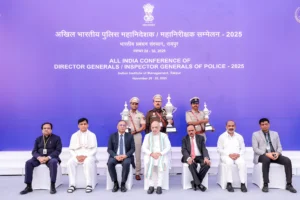
Sushila Karki, aged 73, was sworn in as Nepal’s interim Prime Minister late on Friday, making history as the country’s first female leader.
Karki, who previously served as Nepal’s first woman Chief Justice, took the oath of office from President Ram Chandra Poudel.
The President had spent the day consulting extensively with leaders of the Gen-Z protests, constitutional experts, and the army chief.
Karki’s appointment follows the collapse of the KP Sharma Oli-led government amid violent protests by the Gen-Z youth movement earlier that week.
The demonstrators had called for Oli’s resignation and expressed deep dissatisfaction with his government’s actions.
Complex Negotiations Before Appointment
Prolonged discussions with protest leaders and other political stakeholders centred on whether to dissolve the House of Representatives before or after appointing the new Prime Minister.
Gen-Z protestors ultimately chose Karki’s name, paving the way for her appointment despite considering several alternative non-political candidates.
However, Nepal’s Constitution presents hurdles to Karki’s appointment.
Article 76 mandates that only members of the House of Representatives can serve as Prime Minister, a requirement Karki does not meet, nor do members of the National Assembly qualify.
Furthermore, Article 132(2) bars any former Chief Justice or Supreme Court judge from holding government office, with certain exceptions.
Karki’s appointment is justified under the ‘principle of necessity’, a practice historically invoked in Nepal during times of crisis since the 1950 revolution.
Constitutional lawyer Bipin Adhikari cautioned that reliance on this principle risks eroding constitutional rule and could cause future instability.
Nonetheless, Adhikari acknowledged Karki’s strong record defending the Constitution during her judicial career, recommending her tenure be temporary with power transitioning to an elected government following fresh polls.
Broad Support for Karki’s Appointment
Karki’s selection has won widespread approval across Nepal. Former Chief Justice Kalyan Shrestha praised her integrity and leadership, saying she can be trusted to handle the role despite not being a political figure.
Former Prime Minister Baburam Bhattarai welcomed the decision, highlighting the Gen-Z youths’ desire for a clean, capable interim leader.
He called for full national cooperation and support for Karki as she leads the government through this transitional period.
Adhikari noted that Karki’s government must hold elections on time and ensure justice for victims of the recent protests, which left 51 people dead and caused widespread damage.
Addressing corruption and governance reforms demanded by Gen-Z protestors will also be critical to stabilising the country.
Personal and Professional Background
Born in 1952 in Biratnagar, eastern Nepal, Karki grew up in a politically active family.
Sushila Karki earned a law degree from Tribhuvan University and a master’s in political science from Banaras Hindu University.
She started her law career in 1979, achieved senior advocate status in 2007, and joined the Supreme Court as a judge in 2010. She led the court as Chief Justice from 2016 to 2017.
Moreover, during her judicial tenure, Karki gained recognition for landmark rulings against corruption and abuse of power, including disqualifying a powerful anti-corruption chief and sentencing a minister for corruption.
Durga Subedi, her husband, hijacked Nepal’s first plane in 1973 to fund the armed rebellion against the autocratic Panchayat regime.
Also Read: Sushila Karki To Take Oath As Nepal’s Interim Prime Minister Amidst Gen-Z Protest
To read more such news, download Bharat Express news apps


















